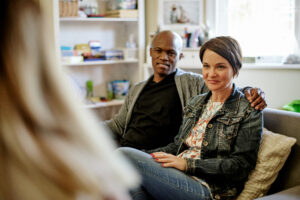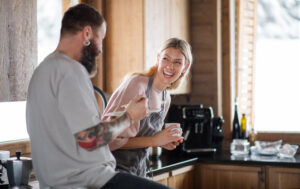I admit, the heading of this blog is pretty bold. I wouldn’t be surprised if you were a little skeptical, thinking… “as if there is just ONE ingredient that can change everything in my relationship.” But I stand by what I wrote and hopefully you will join me after reading this blog.
After years of couples therapy, both Shahn and I have noticed that the presence of ONE thing can make a relationship, while the absence of this same thing will break a relationship.
Ok, you’re probably wondering what this one thing is, so I’ll put you out of your misery…
What is the one key ingredient you need to make your relationship better?
It’s called willingness.
Willingness refers to a state of being open, cooperative and ready to do something with a positive and cooperative attitude. It implies a readiness to accept and work towards a goal or a task.
It’s important to note here, that BOTH partners need to embody willingness for it to work for your relationship.
The direct opposite of willingness is willfulness. willfulness is the one key ingredient that will DESTROY your relationship. If EITHER partner embodies willfulness (most of the time) then your relationship is destined to fail.
Willfulness denotes a stubborn or obstinate determination to pursue one’s own desires or wishes, without regard for the consequences to self or others. Being willful is rejecting, rather than accepting, the moment. Willfulness is resisting the consideration of alternatives or cooperating with others.
Your level of willingness versus willfulness predicts the current state and future of your relationship. High levels of willingness means you will be better able to work as a team and come back together, even after disagreements. Increased willingness results in higher levels of empathy for one another.
The more willful you are, the more stuck on your own opinions, positions, desires and needs you will be. The greater your willfulness, the more conflict, misunderstanding and anger in your relationship.
Therefore, higher levels of willingness in your relationship means you will have a more positive view of one another, a sense of teamwork and connection. Likewise, high willfulness in your relationship will result in more conflict and disconnection.
By being willing in your relationship you will experience amazing positive rewards. These include:
- Improved communication
- Willingness fosters open and honest communication, making it easier to discuss issues and resolve conflicts effectively. You’ll have more emotional connection. It helps build emotional intimacy and trust. You and your partner will feel heard and supported when both are willing to understand each other’s perspectives.
- Increased flexibility and adaptability
- Willingness to compromise and adapt promotes relationship flexibility, reducing rigidity and enhancing the ability to navigate changes and challenges together.
- Increased conflict resolution
- Willingness to work through disagreements constructively can lead to quicker and more peaceful conflict resolution, preventing longstanding grudges.
- Mutual growth
- Both you and your partner can learn and grow together when you are willing to support each other’s personal development and aspirations.
- Strengthened bonds
- Overall, willingness contributes to a stronger bond, greater satisfaction and a more harmonious and fulfilling relationship.
As you read this, you may be thinking “I’m willing, but my partner isn’t, so it’s not going to work.” Unfortunately, you are right! If your partner is being willful, any positive, relationship enhancing skills you try in your relationship, are not going to work.
But don’t give up just yet. Everyone can be willful. Me and you included. Not long ago I willfully engaged in a game of Ten Pin Bowling. I was with Shahn (my husband), my stepkids and my husband’s brother, his wife and their 2 kids. My expectation was that us grown-ups would watch the kids play, which was fine by me. Let me just add in here, I don’t like Ten Pin Bowling, mainly because I’m not good at it. And yes, I’m a bit of a perfectionist and like to be good at what I do. Anyway…. It was to my great disappointment when the grown-ups decided they wanted to join in and play with the kids. I was the only grown-up who wasn’t keen, so rather than sitting out, I reluctantly agreed to join in. For the first half of the game, I participated willfully. I grumbled about my bowling shoes not fitting, my hip hurting when I threw the ball. I FELT the willfulness in my body, I was tense and I felt closed off – both physically and mentally. Thankfully, I was able to notice this. It’s not fun being willful. It’s actually pretty isolating too. Everyone else was having a laugh and enjoying themselves. So I made a choice. I chose willingness. I took some big breaths, tried to open myself up to the experience – both physically and mentally. I coached myself to just be here and participate without it being a competition or something just to get through. I opened up to my husband’s well meaning offers to coach me on how to throw the ball (I’m not sure if that’s the right terminology!), cheered when I hit some pins and when others did well, and laughed at myself when I didn’t. Being willing turned an unwanted experience into something lighter and almost fun.
Hopefully, my little story opens you up to the idea that we can all be willful, so we need to be kind to one another. And also, that willingness is a choice. If your partner is being willful, something is going on inside them. Therefore, try to talk to them about their willfulness. Validate how hard it is to be willing when hurt and upset. And continue to commit to being willing yourself.
In my anecdote above, I mentioned that I was able to identify my willfulness which gave me a choice. This is key. I invite you to try out this experiential exercise to identify your own willingness or willfulness.
- Find a quiet spot and close your eyes.
- Take a few breaths.
- Bring to mind a current conflict or disagreement with your partner. It doesn’t need to be big.
- Tune into your body and notice any sensations or tension. Check out your jaw, shoulders, chest, stomach and hands. Be curious, but don’t judge any of these sensations.
- In your mind’s eye, imagine drawing a circle around where this tension – this willfulness – sits in your body.
- Focus on the resistance you are feeling and ask yourself, “How open am I right now to hear my partner’s perspective without judgement or criticism?”
- Then ask yourself, “How open am I to listen to my partner’s perspective without interrupting or becoming defensive?”
- Take a few deep breaths and imagine the breath traveling through the circle of willful sensation in your body. On the out breath, imagine you are exhaling the willfulness.
- Give this willfulness a colour, breathe into it and make room for it.
- On the out breath, see if you can soften the edges of the circle and the tension in your body.
- Spend a few moments here, breathing in and making room for willfulness, but also letting it go a little. Notice what that’s like.
Willingness requires vulnerability. Being willing might mean you have to own mistakes or be open to your partner’s perspective. This can be uncomfortable and invite feelings of shame. Your ego and pride can also get in the way of being willing. You may have a desire to be right or maintain your pride no matter what. This can hinder the willingness to see your partner’s viewpoint, understand their feelings or accept your partner’s validation.
Self-reflection is key. Examine what might be behind your struggle with willingness. Identify any past experiences or personal beliefs that might be influencing your willingness or willfulness.
Another helpful tip is to remember the importance of the relationship as a whole. Prioritise its wellbeing over winning an argument. A strong, healthy partnership requires compromise and a willingness to work together.
I hope this blog has helped you see this vital ingredient in your relationship. Remember, willingness is a choice which can me made in any given moment and in any given situation. I invite you to make that choice time and time again.
Until next time,
Helen




